-
Activists in the biggest staff-student campaign to defend education seen in Australia for decades have won a partial victory against an attempt by the University of Sydney administration to cut hundreds of teaching and non-teaching jobs. The immediate job cuts have been reduced to 23 under pressure from the campaign. But staff and students are keeping up the fight. The photos below are of a rally and march of 500 people held on May 7, during which the administration called in the police and riot squad.
-
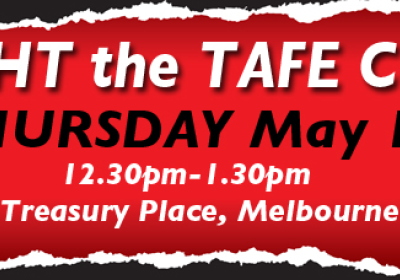 As part of savage budget cuts, the Victorian Coalition government has slashed $300 million over four years of funding for the provider of public technical and further education, the state’s 18 TAFE institutes that teach about 400,000 students a year. Funding per student in 80% of courses has been cut from about $8 per training hour to as low as $1.50 - to a range meant to reflect labour market priorities. Trades apprenticeships, aged care and child care received some small increases.
As part of savage budget cuts, the Victorian Coalition government has slashed $300 million over four years of funding for the provider of public technical and further education, the state’s 18 TAFE institutes that teach about 400,000 students a year. Funding per student in 80% of courses has been cut from about $8 per training hour to as low as $1.50 - to a range meant to reflect labour market priorities. Trades apprenticeships, aged care and child care received some small increases. -
 For the past 12 weeks, students of Quebec’s colleges and universities have been on strike against Premier Jean Charest’s proposal to increase tuition fees by 75%. The indefinite strike involves more than 170,000 students and is now attracting high school students. Broad layers of the general public are sympathetic to the movement.
For the past 12 weeks, students of Quebec’s colleges and universities have been on strike against Premier Jean Charest’s proposal to increase tuition fees by 75%. The indefinite strike involves more than 170,000 students and is now attracting high school students. Broad layers of the general public are sympathetic to the movement. -
The Australian Education Union (AEU) released the statement below on May 3. * * * The huge funding cuts announced by the Victorian government to its TAFE institutes will damage the TAFE sector in Victoria and the Victorian economy and community. They will also change the national Vocational and Education Training (VET) system forever. Late in 2011, the Victorian government ripped millions out of TAFEs budgets. Private providers were left largely untouched.
-
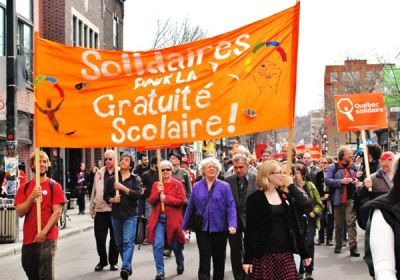
A crowd estimated at 250,000 people or more wound its way through Montréal April 22 in Quebec’s largest ever Earth Day march. They raised many demands: an end to tar sands and shale gas development, opposition to the Quebec government’s Plan Nord mining expansion, support for radical measures to protect ecosystems, and other causes.
-
 Students and staff at the University of Sydney ramped up the campaign against management's proposed staff cuts last week, after management ignored a deadline set by the rally and occupation on April 4 to withdraw the cuts by the end of the Easter break. Four hundred students rallied on the university's front lawns on April 24. Students from more than eight classes walked out to join the rally. In one case, a lecturer emailed her students in advance to tell them to walk out of their class and join the protest.
Students and staff at the University of Sydney ramped up the campaign against management's proposed staff cuts last week, after management ignored a deadline set by the rally and occupation on April 4 to withdraw the cuts by the end of the Easter break. Four hundred students rallied on the university's front lawns on April 24. Students from more than eight classes walked out to join the rally. In one case, a lecturer emailed her students in advance to tell them to walk out of their class and join the protest. -

In the largest protest so far in a campaign that has grown steadily since the start of semester, 1500 University of Sydney students and staff rallied on April 4 to protest against the university management's move to sack 360 academic and general staff.
-
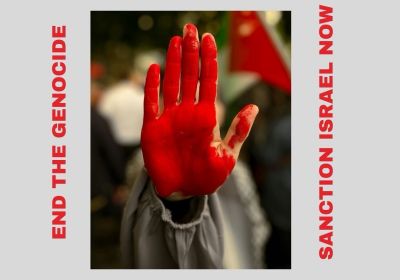
1500 Sydney University students and staff rallied on April 4 to protest against management's move to sack 360 staff. Protesters marched through the university, culminating in 100 students occupying the Arts administration building in opposition to the attacks.
-
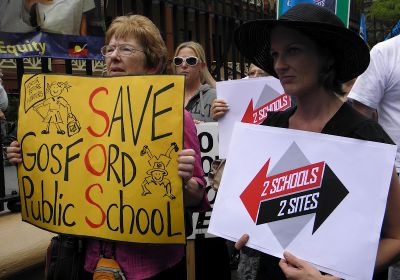 About 100 teachers, parents and concerned community members rallied outside NSW parliament on March 29 to protest against the relocation of Gosford Public Schools to the grounds of Henry Kendall High School. Speakers at the rally included Unions NSW secretary Mark Lennon, NSW Teachers Federation president Maurie Mulheron, NSWTF officer Debbie Westacott, NSW Greens Legislative Council member John Kaye as well as staff and parents from Gosford Public School.
About 100 teachers, parents and concerned community members rallied outside NSW parliament on March 29 to protest against the relocation of Gosford Public Schools to the grounds of Henry Kendall High School. Speakers at the rally included Unions NSW secretary Mark Lennon, NSW Teachers Federation president Maurie Mulheron, NSWTF officer Debbie Westacott, NSW Greens Legislative Council member John Kaye as well as staff and parents from Gosford Public School. -
The NSW Coalition government is pushing ahead with plans to relocate Gosford Public School and sell the school site to commercial developers. The site has waterfront views and is considered prime real estate. The decision comes despite a 10,000 strong petition against the plan collected by the Gosford community. Parents, teachers, students and supporters held a protest outside NSW parliament on March 29 while the petition was being read inside.
-
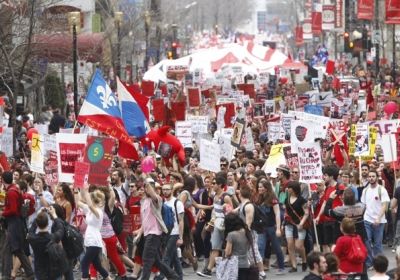 Tens of thousands of students and their supporters marched in big Quebec cities on March 18 to oppose the Quebec Premier Jean Charest’s government’s promise to impose a 75% rise in post-secondary education fees over the next five years. In Montreal, about 30,000 “former, present and future university students” protested. The march stretched for more than 1.5 kilometres, newspaper Le Devoir said. Thousands more marched in Quebec City, Sherbrooke and Alma.
Tens of thousands of students and their supporters marched in big Quebec cities on March 18 to oppose the Quebec Premier Jean Charest’s government’s promise to impose a 75% rise in post-secondary education fees over the next five years. In Montreal, about 30,000 “former, present and future university students” protested. The march stretched for more than 1.5 kilometres, newspaper Le Devoir said. Thousands more marched in Quebec City, Sherbrooke and Alma. -
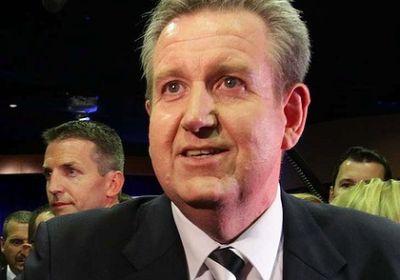 The New South Wales Liberal government said on March 11 that it planned to force schools to bear the responsibility for its latest funding cuts. The government did not consult the NSW Teachers Federation (NSWTF) before releasing the “Local Schools, Local Decisions” and “Empowering Local Schools” initiatives, which it claimed would deliver “autonomy” to local public schools. In reality, the move is a smokescreen that forces public school principals to implement the government cuts of $250 million a year.
The New South Wales Liberal government said on March 11 that it planned to force schools to bear the responsibility for its latest funding cuts. The government did not consult the NSW Teachers Federation (NSWTF) before releasing the “Local Schools, Local Decisions” and “Empowering Local Schools” initiatives, which it claimed would deliver “autonomy” to local public schools. In reality, the move is a smokescreen that forces public school principals to implement the government cuts of $250 million a year.
Education
Education